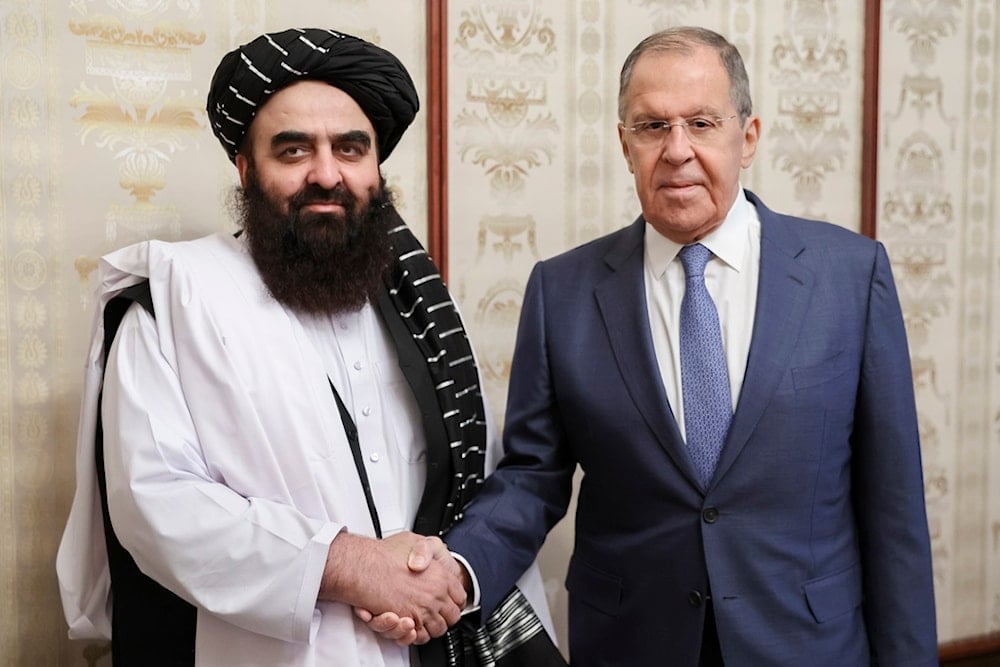Taliban discuss with Russia, China transactions via local currencies
The Taliban administration is in advanced talks to settle trade in rubles and yuan amid US sanctions and a shrinking supply of US dollars to Afghanistan.
-

Russian Foreign Minister Sergey Lavrov, right, and Acting Foreign Minister of Afghanistan's Taliban movement Amir Khan Muttaqi pose for a photo prior to their talks in Moscow, Russia, Oct. 4, 2024. (Russian Foreign Ministry Press Service via AP)
The Taliban administration is in advanced talks with Russia to begin settling trade in local currencies, with discussions also underway with China, Afghanistan’s acting commerce minister revealed Friday, as reported exclusively by Reuters.
The move would mark a significant shift in the country's economic alignment as Kabul seeks to escape the constraints of US-led sanctions and a shrinking supply of US dollars.
Haji Nooruddin Azizi, acting Minister of Commerce and Industry, said both Moscow and Kabul had formed technical teams to advance the discussions, with a focus on enabling direct transactions in rubles and afghanis.
"We are currently engaged in specialised discussions on this matter, considering the regional and global economic perspectives, sanctions, and the challenges Afghanistan is currently facing, as well as those Russia is dealing with," Azizi said in an interview for Reuters.
Kabul proposes yuan transactions in ongoing talks with China
Azizi also confirmed that similar proposals had been shared with China, where discussions are ongoing through a working group formed between the Afghan Commerce Ministry and the Chinese embassy in Kabul.
“We want to take steps in this area with China as well,” he said, noting that Afghanistan’s annual trade with China stands at approximately $1 billion. He added that the joint working team with China is focusing on enabling currency-based transactions that could bypass the traditional dollar-dominated system.
US sanctions isolate Afghan banking from global system
Since the Taliban’s return to power in 2021, Afghanistan has been largely cut off from international banking networks due to sanctions imposed on Taliban officials and entities. Billions in Western aid were halted, and humanitarian funds, mostly in the form of US dollars, flown in, have drastically declined since early 2024.
Azizi said the drop in dollar inflows has created an urgent need for alternative payment channels. “This is a very good option,” he emphasized, “we can use this option for benefit and interests of our people and our country.”
Despite the reduced access to global finance, Azizi said Afghanistan’s currency, the afghani, has remained relatively stable.
He credited this in part to growing interest from the Afghan diaspora and the administration’s push for increased foreign investment.
Russia, China deals reflect shift from dollar dependency
Afghanistan currently trades about $300 million annually with Russia, largely in petroleum products, wheat, and industrial goods, such as plastics.
Azizi suggested that bilateral trade with Moscow could expand significantly under a localized currency arrangement.
The push comes as Moscow itself continues to advocate for de-dollarization. In December, Russian President Vladimir Putin openly questioned the logic of holding foreign currency reserves, warning they could be confiscated for political reasons.
He instead promoted using national currencies and investing domestically.
For Afghanistan, aligning with this strategy offers both political and practical advantages: reduced exposure to dollar-based sanctions and potentially smoother trade logistics with sympathetic regional powers.
Kabul aims to boost energy imports and investment flows
Since 2022, Afghanistan has signed several import agreements with Russia, including for gas and oil. The currency settlement initiative is expected to streamline these imports and shield both economies from dollar-based restrictions.
Azizi also cited the example of development deals with firms from China and Russia that would benefit from localized transactions. "This is not just a currency issue," he said, "it's a structural issue for long-term economic sovereignty."
While neither the Chinese foreign ministry nor the Russian central bank has formally commented, the Taliban see the shift to ruble and yuan transactions as a path to restoring financial autonomy in a system where the dollar has long dominated.

 4 Min Read
4 Min Read








